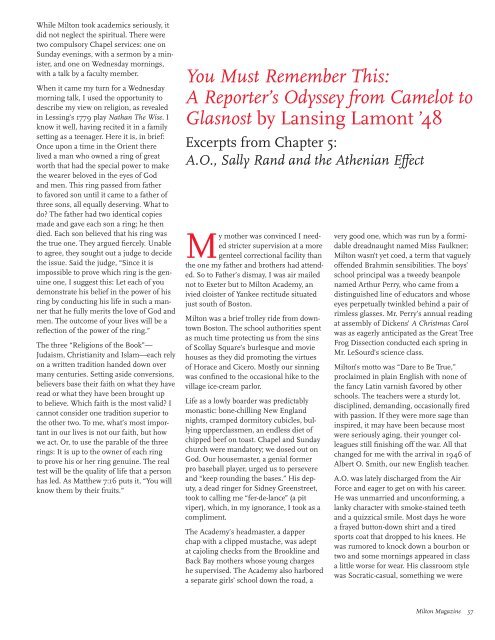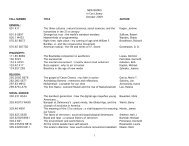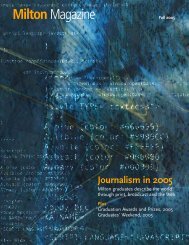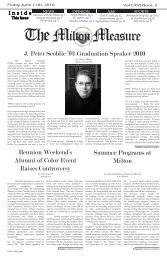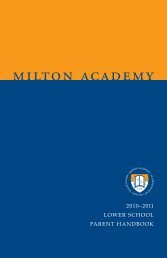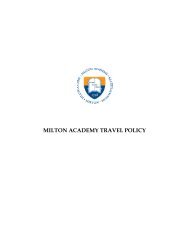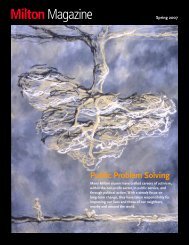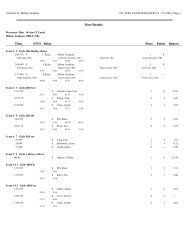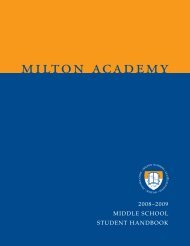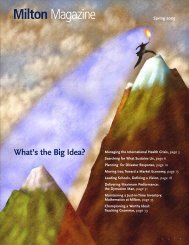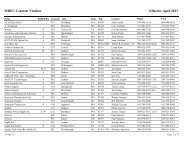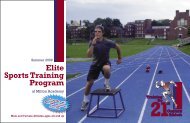Milton Magazine - Milton Academy
Milton Magazine - Milton Academy
Milton Magazine - Milton Academy
- No tags were found...
Create successful ePaper yourself
Turn your PDF publications into a flip-book with our unique Google optimized e-Paper software.
While <strong>Milton</strong> took academics seriously, itdid not neglect the spiritual. There weretwo compulsory Chapel services: one onSunday evenings, with a sermon by a minister,and one on Wednesday mornings,with a talk by a faculty member.When it came my turn for a Wednesdaymorning talk, I used the opportunity todescribe my view on religion, as revealedin Lessing’s 1779 play Nathan The Wise. Iknow it well, having recited it in a familysetting as a teenager. Here it is, in brief:Once upon a time in the Orient therelived a man who owned a ring of greatworth that had the special power to makethe wearer beloved in the eyes of Godand men. This ring passed from fatherto favored son until it came to a father ofthree sons, all equally deserving. What todo? The father had two identical copiesmade and gave each son a ring; he thendied. Each son believed that his ring wasthe true one. They argued fiercely. Unableto agree, they sought out a judge to decidethe issue. Said the judge, “Since it isimpossible to prove which ring is the genuineone, I suggest this: Let each of youdemonstrate his belief in the power of hisring by conducting his life in such a mannerthat he fully merits the love of God andmen. The outcome of your lives will be areflection of the power of the ring.”The three “Religions of the Book”—Judaism, Christianity and Islam—each relyon a written tradition handed down overmany centuries. Setting aside conversions,believers base their faith on what they haveread or what they have been brought upto believe. Which faith is the most valid? Icannot consider one tradition superior tothe other two. To me, what’s most importantin our lives is not our faith, but howwe act. Or, to use the parable of the threerings: It is up to the owner of each ringto prove his or her ring genuine. The realtest will be the quality of life that a personhas led. As Matthew 7:16 puts it, “You willknow them by their fruits.”You Must Remember This:A Reporter’s Odyssey from Camelot toGlasnost by Lansing Lamont ’48Excerpts from Chapter 5:A.O., Sally Rand and the Athenian EffectMy mother was convinced I neededstricter supervision at a moregenteel correctional facility thanthe one my father and brothers had attended.So to Father’s dismay, I was air mailednot to Exeter but to <strong>Milton</strong> <strong>Academy</strong>, anivied cloister of Yankee rectitude situatedjust south of Boston.<strong>Milton</strong> was a brief trolley ride from downtownBoston. The school authorities spentas much time protecting us from the sinsof Scollay Square’s burlesque and moviehouses as they did promoting the virtuesof Horace and Cicero. Mostly our sinningwas confined to the occasional hike to thevillage ice-cream parlor.Life as a lowly boarder was predictablymonastic: bone-chilling New Englandnights, cramped dormitory cubicles, bullyingupperclassmen, an endless diet ofchipped beef on toast. Chapel and Sundaychurch were mandatory; we dosed out onGod. Our housemaster, a genial formerpro baseball player, urged us to persevereand “keep rounding the bases.” His deputy,a dead ringer for Sidney Greenstreet,took to calling me “fer-de-lance” (a pitviper), which, in my ignorance, I took as acompliment.The <strong>Academy</strong>’s headmaster, a dapperchap with a clipped mustache, was adeptat cajoling checks from the Brookline andBack Bay mothers whose young chargeshe supervised. The <strong>Academy</strong> also harboreda separate girls’ school down the road, avery good one, which was run by a formidabledreadnaught named Miss Faulkner;<strong>Milton</strong> wasn’t yet coed, a term that vaguelyoffended Brahmin sensibilities. The boys’school principal was a tweedy beanpolenamed Arthur Perry, who came from adistinguished line of educators and whoseeyes perpetually twinkled behind a pair ofrimless glasses. Mr. Perry’s annual readingat assembly of Dickens’ A Christmas Carolwas as eagerly anticipated as the Great TreeFrog Dissection conducted each spring inMr. LeSourd’s science class.<strong>Milton</strong>’s motto was “Dare to Be True,”proclaimed in plain English with none ofthe fancy Latin varnish favored by otherschools. The teachers were a sturdy lot,disciplined, demanding, occasionally firedwith passion. If they were more sage thaninspired, it may have been because mostwere seriously aging, their younger colleaguesstill finishing off the war. All thatchanged for me with the arrival in 1946 ofAlbert O. Smith, our new English teacher.A.O. was lately discharged from the AirForce and eager to get on with his career.He was unmarried and unconforming, alanky character with smoke-stained teethand a quizzical smile. Most days he worea frayed button-down shirt and a tiredsports coat that dropped to his knees. Hewas rumored to knock down a bourbon ortwo and some mornings appeared in classa little worse for wear. His classroom stylewas Socratic-casual, something we were<strong>Milton</strong> <strong>Magazine</strong> 57


